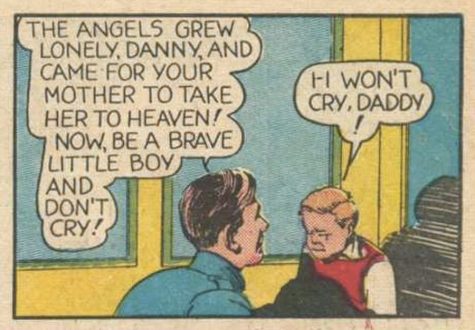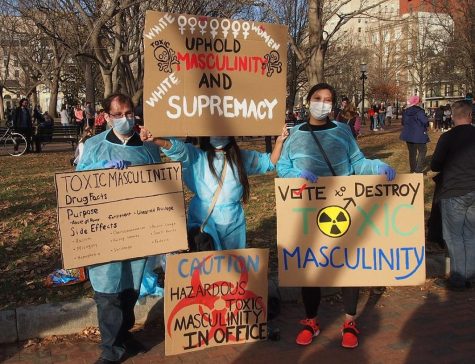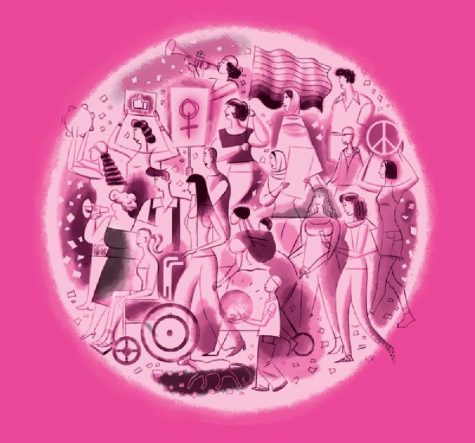Is Your Masculinity Toxic?
March 15, 2019

Boys afraid to show any emotion that isn’t anger. Adults telling boys to “man up.” The mindset that men deserve a dominant position in society. These situations are all examples of toxic masculinity being a prevalent and pressing issue in our society.
To clarify, not all masculinity is toxic. Masculinity and femininity are important, basic markers of identity. However, when either is toxic, it can be extremely harmful.

Toxic masculinity is defined as the practice that legitimizes a man’s dominant position in society and justifies the subordination of women. Many boys grow up with an idealized version of how a man should act and how a man should look. Their inappropriate actions are excused with phrases such as “boys will be boys.” These excuses teach young boys that their negative actions don’t always have consequences.
Dominance and violence are commonly associated with masculinity and are often accompanied by the fear of showing emotions besides anger. This results in men being significantly more likely to take their own lives. A study done by the National Center for Health Statistics reports that men are 3.5 times more likely to commit suicide than women. Many are scared to open up about their feelings with the fear that they will be ridiculed by their peers and perceived as feminine.

One term often used to describe the societal norms for men is called the “man box.” The people living in this so-called box feel pressure from society to act tough and hide signs of weakness. As Katie Carlson, an international gender specialist and woman’s rights activist has stated, by raising boys to grow up into men who believe that they have the right to be dominant over others and that women are somehow inferior to them, we are giving them permission to use violence as a tool to get whatever they want.
In today’s world, the media plays an immense role in shaping people’s minds. Impressionable children, more now than ever, are exposed to shows that portray masculinity as being powerful and dominant and further affirm traditional gender roles and stereotypes in society. Many young boys will grow up and go into adulthood with the idea that they are superior to women solely because of their gender.
At ASIJ in particular, toxic masculinity seems to be prevalent. It is quite rare to see a male high school student at our school being open about his emotions and not being ridiculed by his peers. And when a student does open up, he is mocked and told things such as “you’re so gay,” or “don’t be such a girl.” This type of behavior is the driving force of toxic masculinity as it further establishes inaccurate stereotypes for how men should act.

With the #MeToo movement and companies such as Gillette using their large platform to spread the word about these pressing issues, slowly but surely, the culture is changing. This is not about scapegoating all men and suggesting that they are all toxic or harmful. It is about encouraging boys to open up about their emotions without fearing being perceived as feminine. Manhood is not measured by strength, and masculinity does not mean dominance. Emotions don’t make a person feminine; they make him human.




















Ava • Dec 13, 2019 at 2:17 PM
I really enjoyed your article! This issue is prevalent at ASIJ and is not commonly addressed. It is a very important topic as traditional cultural masculine norms can be extremely harmful to boys and men and it should be talked about more. Thank you for addressing this issue!
Cooper • Dec 13, 2019 at 8:41 AM
I agree that this issue is very apparent at ASIJ and should be talked about more often. Feminism is talked about a lot but the dangers of toxic masculinity don’t seem to get as much notice. Thank you for addressing this problem!
Riko • Dec 12, 2019 at 10:11 AM
I think this is very true and is a problem that isn’t addressed very often. I think its mostly cause by society and the way that he grew up. Men from very early have been treated and believed as if they had a higher power in society so its kind of like history and changing its ways is gonna take a while but I don’t think men should ever feel pressured to hide emotions, they’re human too.
Ottilia Iglesias Harkess • Dec 12, 2019 at 8:33 AM
I really enjoyed reading this article as I agree that Toxic Masculinity is an important issue that definitely needs to be talked about more. I liked how you provided many examples of how this issue is prevalent to the lives of many men and boys today including those at ASIJ. I also think that we can do more at ASIJ in terms of this issue. Thank you for the great article!
Lukas Fackler • Sep 12, 2019 at 11:40 PM
Men should not get weaker. Women should just get stronger. Who in their right mind would ever want to get weaker?
Dr. Herzenberg • Aug 12, 2019 at 4:22 PM
Sorry for the very late comment but I felt compelled to write. This is a great piece and very important for our community and society. It is important to understand that blaming sides for the existence of the box of masculinity is compelling but fruitless. I find it more productive to see how it negatively impacts us all, regardless of gender identity, and seek to understand how to deconstruct this divisive force.
Thank you Kokoro for sharing this!
Dr. Herzenberg
Mrs. Bennett • Apr 19, 2019 at 7:41 PM
Thank you for this article Kokoro. I am very interested in how we can better teach people to be aware of their use of stereotypical language. Phrases such as “you’re so gay,” or “don’t be such a girl” are unacceptable and have no place in our vernacular. Phrases such these show a lack of compassion and empathy. If there are any students interested in tackling stereotypical language at ASIJ, I would be interested in talking with you.
Warren Lavender • Apr 18, 2019 at 10:57 AM
Excellent article Kokoro! I’m glad you made mention of the Gillette ad. Great work.
Marin Fujino • Mar 22, 2019 at 2:58 PM
I agree with your idea that masculinity can be toxic and is causing harm to the boys because many boys chase after the idea of being masculine and are affecting the way they think about their body and have created a stereotype of what guys need to be like.
Nicole • Mar 22, 2019 at 10:44 AM
I think that this article is very important right now, especially at ASIJ. I like how you are talking about encouraging boys and not bringing them down by criticizing their toxic masculinity. It is not about fighting fire with fire. I think it’s important for students and boys, in general, to feel open about their emotions, and this change can start with us at ASIJ.
Vishal Subramanian • Mar 22, 2019 at 9:19 AM
First of all, this article is somewhat riddled with problems. Toxic masculinity is the result of women pressuring men to be brave and it is not men who created the concept. For example, during World War I, if men didn’t go to serve their country, women in western countries would make fun of them for being weak. Furthermore, men are not always violent and being a leader in most cases isn’t a crime; in fact, taking leadership, especially in times of crisis, should actually be commended, not despised. Moving on, men acting strong is not a crime as it helps men become tougher and have a thicker skin when they grow up. Next, you state that “It is quite rare to see a male high school student at our school being open about his emotions and not being ridiculed by his peers” yet what examples do you have to prove it. All in all, although this article is somewhat riddled with errors, I will give you credit for a good writing style.
Kai Holm • Mar 22, 2019 at 9:08 AM
I believe that this article is helpful in opening everyone’s eyes to this problem. I personally agree that I am part of the problem and so I say that we can all change if we just put a bit of effort in. Doing things such as controlling what we say to our friends can go a long way as it can give them the confidence to be able to speak up in the future. Thank you for this article.
Kaho Sakemi • Mar 22, 2019 at 9:08 AM
I definitely feel like some of the students in our grade tend to hide their emotions or discriminate others so that they appear to be “strong” compared to others. I appreciate how you are spreading the message. Koko you’re such a great writer!
Shiori Harima • Mar 22, 2019 at 9:01 AM
This article is very interesting! I really like how you connected what is going outside in the world with what is going on in ASIJ.